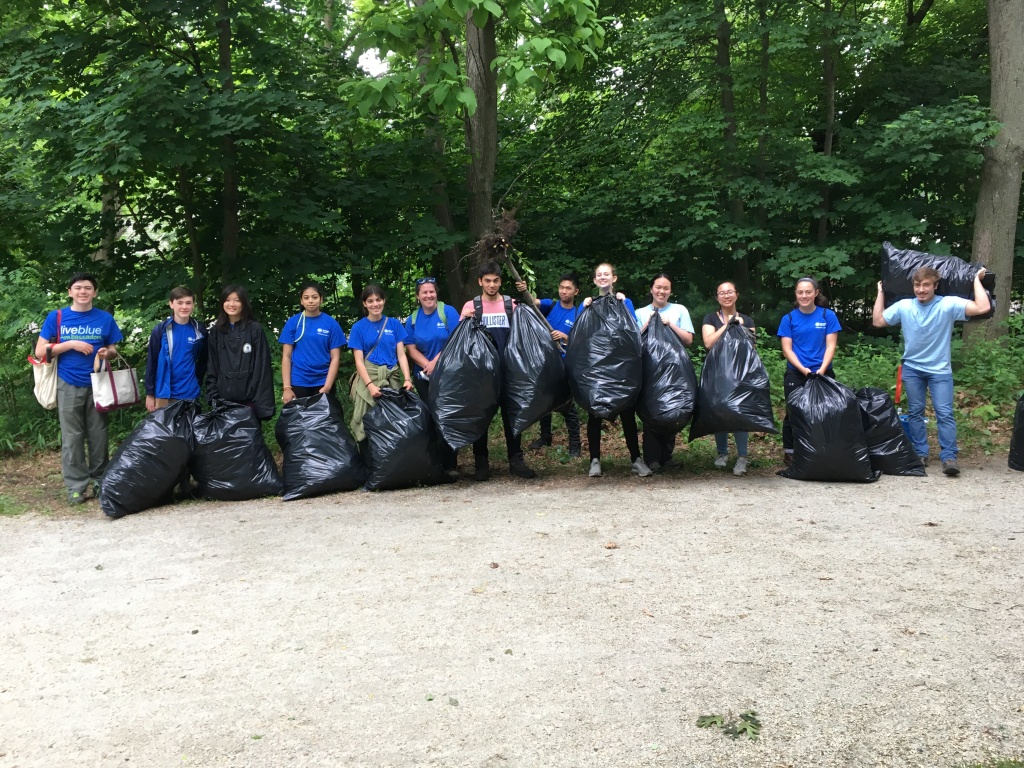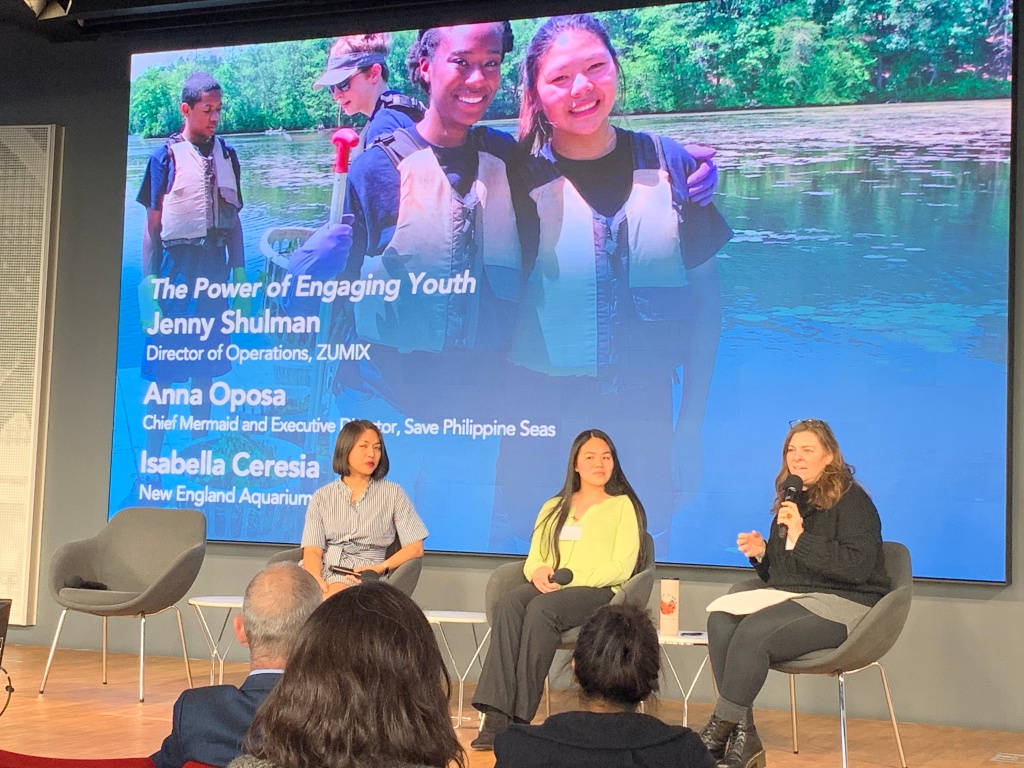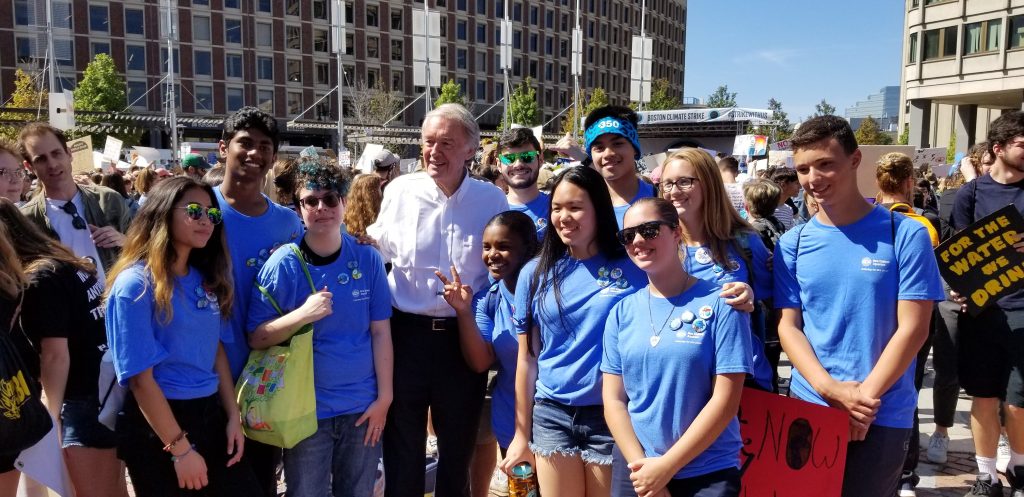
This week’s Student Feature Friday is senior Isabella Ceresia whose passion for the environment has led to many interesting and rewarding experiences. Isabella’s interest in animals started at an early age when she would receive books from her cousins and would spend long periods of time reading and learning about all kinds of animals. She also spent quite a bit of time at the aquarium when she was younger and in 9th grade, was invited to participate in ClimaTeens, a group of dedicated teens 14 to 18 years old who care about the oceans and want to contribute to a healthy future. Through her work in this program she was twice invited as a panelist to educate the public on the environment and the power of engaging youth.
Isabella’s passion and care for the environment extended to her own community of Holliston when she coordinated a large project with NHS students, New England Aquarium Live Blue Ambassadors and the Town of Holliston Conservation Commission to remove 9 different types of invasive species from the Holliston Rail Trail. Whether it’s protecting endangered Right Whales, participating in climate change strikes, fishing in the middle of the ocean to determine the catch and release mortality rate of groundfish with different fishing gear, or strengthening her skills as a 2nd Degree Black Belt in Yoshitsume Jutitsu and a 1st Degree Black Belt in Hakko Denshin Ryu Jujutsu, Isabella is an incredibly impressive student who cares deeply about her environment and wants to make the world a better place. I have no doubt that she will have a big impact on protecting the environment for future generations.

Q: Your passion for protecting the environment and your love of animals and wildlife are clearly fueling your endeavours. Where did your interest in wildlife originate?
A: While growing up, I’ve been surrounded by so many experiences that have reinforced my love for aquatic life, which makes it difficult to choose only one. My mother’s passion for the environment and her career in the science field became a shared passion at a young age. I recall trips to the New England Aquarium, whose animals and exhibits always fascinated me. Together we watched National Geographic and Animal Planet nonstop, whose channels demonstrated the significance of the ecosystems and its inhabitants and inspired a sense of passion for the ocean and marine life. She opened me up to to a world that hooked me and it’s almost although this passion for our ecosystem is part of my DNA. Simple experiences like these have encouraged me to learn more about this subject and push me to get involved in more programs that would support my love for the ocean and our environment. Over the years, I have been afforded the opportunity to participate in programs at the New England Aquarium, such as, Climateens, Live Blue Ambassadors, and ACCOL, which continue to stimulate my passion for marine life. They teach me important facts about the effects of climate change, possible solutions to improve and conserve our environment, and ways to communicate this knowledge to the public.

Q: Can you describe why your experience with ACOLL has been so powerful for you and how it has shaped your future interests?
A: I was always interested in field research but I didn’t have much experience, except when I went to Peru in freshman year, so this was the real first-hand experience to work alongside scientists who were collecting data in an actual study. It kind of solidified that this is what I would like to do as a career. I was able to find what these scientists did on a regular basis. For example, for the big fishing trip, I had to wake up at 3:30 AM to get to New Hampshire by 5:00 AM to get on the boat. We then set off and waited for 2 hours to actually get to the proper fishing place. I loved being on the boat and collecting all the data. I also found it incredibly interesting to analyze the data and find ways on how to present it (which was something I didn’t really expect).
Q: When asked about improvements at HHS you stated that there should be more taught to students about becoming politically active. Why do you think this is so important for students and how have you become politically active outside of HHS?
A: I’ve always been a little intimidated by politics and never thought that my voice would make an impact on our government so I tended to listen instead and gain insight based on other people’s opinions. I think that if our school presented facts and some opinions on different current figures, people would be able to form their own ideas, instead of piggy-backing off of another. I think it’s especially important to the seniors, who will be voting in 2020. I’m personally still trying to find how to become politically active but I’ve been able to participate in the Boston Climate Strike in September. I think the best way is to find something you are really passionate about and find events that relate to that. I also think you can be more politically aware by asking the people around you about their opinions and just having a conversation about it.

Q: What advice do you have for students who are still searching for their passion or interest in life?
A: I’d probably say not to be too worried about finding one big passion or interest right now. it’s something that you find naturally as long as you’re open to new experiences. By stepping out of your box, you can potentially find an interest that you’d never known about.
